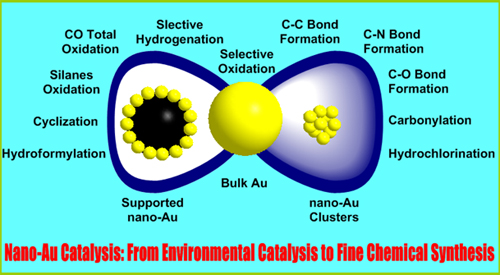LICP Develops Nano-gold Catalysts for Synthesis of Various Fine Chemicals

Nano-gold catalysis has been one of the hot topics in catalytic chemistry. Much work has been done concerning the fabrication of nano-gold catalysts and studies of their catalytic performance.
Researchers at the Center for Green Chemistry and Catalysis, Lanzhou Institute of Chemical Physics (LICP), Chinese Academy of Sciences (CAS), have been engaging in nano-gold catalysis since 2000 and have made a series of achievement.
They have for the first time reported nano-gold catalyzed oxidative carbonylation of amines to construct N-substituted carbamate and polymer-supported nanogold catalyzed activation of carbon dioxide for the synthesis of cyclic carbonate. They have also found for the first time that ferric hydroxide supported Au catalysts could exhibit enhanced activity and selectivity in the chemoselective hydrogenation of aromatic nitro compounds. In addition, they have developed preparation method of highly active nano-gold catalysts without calcinations.
Their work has been published in Appl. Catal., B: Environ. (2001, 31, L1-L4; 2006, 66, 241-248), J. Catal.(2002, 211, 548-551; 2009, 261, 241-244), Chem. Commun.(2003, 2192-2193; 2009, 653-655; 2011, 47, 6476-6478), J. Am. Chem. Soc.(2005, 127, 4182-4183), Appl. Catal., A: Gen.(2008, 340, 220-228), Dalton Trans.(2008, 2542-2548)etc.
Based on their previous work, recently they have published a review entitled Nano-gold catalysis in fine chemical synthesis in Chem. Rev.(doi: 10.1021/cr200260m) introducing the use of nano-gold catalysts in fine chemical synthesis. The publication of the paper shows that their work has received worldwide recognition.
The above work has received support from the National Natural Science Foundation of China and Chinese Academy of Sciences.
Next Article:Delegation of Huaian Visited LICP